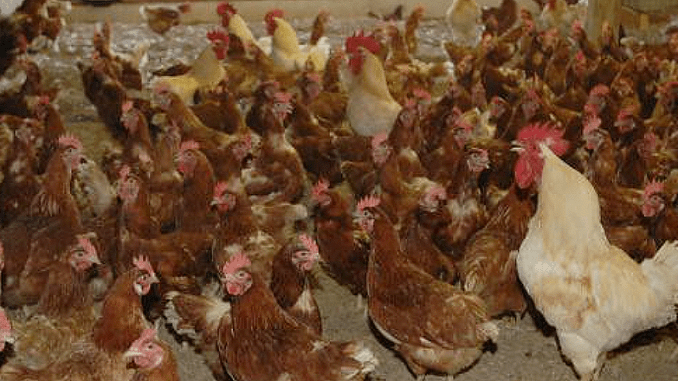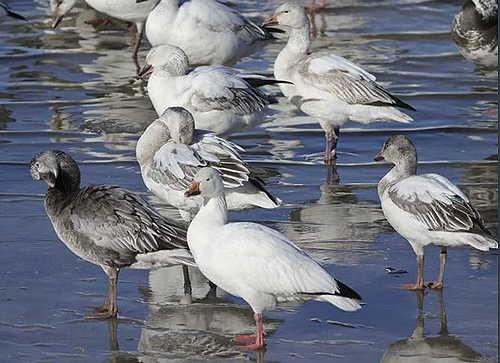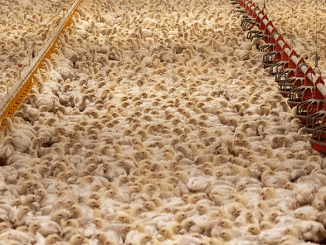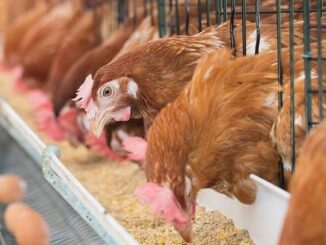
FRANKFORT, Kentucky, February 24, 2022 (ENS) – Federal officials this week notified the Kentucky Department of Fish and Wildlife Resources that highly pathogenic avian influenza, commonly called bird flu, has been detected in Kentucky waterfowl and in commercial operations.
Recent testing at the U.S. Department of Agriculture’s National Veterinary Services Laboratories confirmed the presence of highly pathogenic avian influenza, HPAI, in samples from two sick snow geese collected at Ballard Wildlife Management Area in Ballard County.
“The public health risk posed by this disease is low and meat harvested from wild birds does not present a food safety risk when handled and cooked properly,” the USDA said.
Still, in view of this detection and others in commercial poultry operations in Fulton and Webster counties, federal and state agencies are recommending that anyone involved with poultry production, from commercial producers to those with small backyard flocks, review their biosecurity practices to ensure the health of their birds.
“There are many different subtypes of avian influenza viruses,” said Dr. Christine Casey, wildlife veterinarian for Kentucky Fish and Wildlife. “These viruses are classified as either ‘low pathogenic’ or ‘highly pathogenic’ based on their ability to produce disease in domestic poultry. Wild waterfowl do not typically exhibit signs of disease, but mortality can occur in wild birds infected with highly pathogenic strains.”

In recent months, HPAI has been detected in waterfowl from several Atlantic Flyway states. The USDA has announced bird flu findings in Virginia, New York, Maine, Delaware, Michigan and Indiana – some sick birds found in small, backyard flocks and others on poultry farms.
“So far, Kentucky has only two counties with affected poultry facilities,” said Tony Pescatore, professor and extension poultry specialist for the University of Kentucky Department of Animal and Food Sciences. “Highly pathogenic avian influenza, HPAI, is very contagious and often fatal for domesticated poultry. We want to make sure producers know how to recognize the signs of HPAI and how to report it if they suspect their birds are sick.”
At-risk birds include chickens, turkeys, pheasants, quail, ducks, geese and guinea fowl.
Free-flying migratory waterfowl, such as ducks, geese and shorebirds may also carry HPAI without showing any signs of illness.
“We’ve learned that state officials have detected HPAI in waterfowl in our state,” Pescatore said. “So, it’s in the flyway, and we need to be vigilant. The Kentucky Department of Fish and Wildlife Resources ask that die-offs of wild waterfowl, shore birds, birds of prey or wild turkeys be reported to them. Die-offs of other bird species when more than five have died should be reported also. Shoes, clothing and vehicles need to be cleaned when returning from areas where there are wild birds.”
Signs of HPAI in poultry include sudden death of birds without clinical signs. Birds may exhibit respiratory signs including nasal discharge, coughing and sneezing or decreased water consumption. They may also show a lack of energy or appetite, decreased egg production or produce soft-shelled or misshapen eggs.
“It’s important to note that many of the symptoms can also be related to other more common poultry ailments,” Pescatore said.
The disease spreads through direct contact among birds and through their droppings. People may spread HPAI by moving infected birds, equipment and feed and by wearing clothing and shoes that have been in the affected areas.
“It’s a good practice to shower, wash your clothes and change your shoes before handling your birds, especially if you’ve visited friends or families with birds,” Pescatore said. “Also, take these same steps after handling your own birds if you plan to visit others who own birds. Keep your birds away from other birds.”
Anyone who notices the signs of HPAI in their birds or in wild, free-flying birds may report their findings to the U.S. Department of Agriculture Sick Bird Hotline at 866-536-7593.
Featured image: Chickens can catch bird flu. This flock is under the care of the U.S. Dept. of Agriculture’s Animal and Plant Heath Inspection Service (Photo courtesy USDA)



